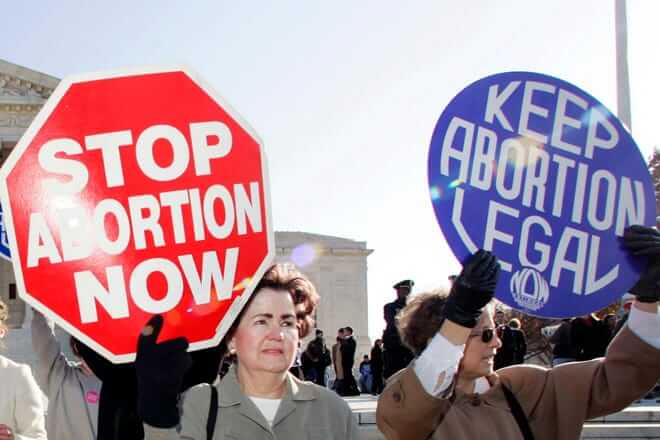A Texas law that bans abortion after six weeks of pregnancy and makes abortion services illegal came into effect on Wednesday after the United States (US) Supreme Court refused to block it despite severe criticism.
The law states that anyone can sue a person who “aids or abets” an abortion that takes place in Texas after six weeks of pregnancy for a minimum of $10,000 plus attorney fees.
Upholding law SB8, the Court stated, “In reaching this conclusion, we stress that we do not purport to resolve definitively any jurisdictional or substantive claim in the applicants’ lawsuit.” “In particular, this order is not based on any conclusion about the constitutionality of Texas’s law, and in no way limits other procedurally proper challenges to the Texas law, including in Texas state courts,” it went on to say.
The decision allows abortion providers to challenge the law in the future, and there is even a “likelihood” that the case will return to the Supreme Court for further evaluation.
Anti-abortion laws such as this, which are predominantly proposed by Conservatives, are primarily opposed with the argument that it denies women’s rights over their own bodies. Another counter to this anti-abortion law highlights that it goes against the constitutional ethos of the US and would nullify Roe v. Wade judgement.
Roe v. Wade was a landmark judgement passed by the US Supreme Court in 1973. The Court ruled that a ban on abortion by any state law is unconstitutional and legalised abortions in any justifiable circumstance across the US. The judgement was grounded on women’s rights and qualified as implicit within the right to privacy protected by the 14th Amendment to the Constitution.
However, law SB8 overturns Roe v. Wade and puts it at the risk of complete dissolution in Texas.
Meanwhile, President Joe Biden condemned the law and pledged to protect the constitutional right to abortion. “This extreme Texas law blatantly violated the constitutional right established under Roe v. Wade and upheld as precedent for nearly half a century,” he said in an official White House statement.
Biden highlighted the law’s shortcomings, saying: “The Texas law will significantly impair women’s access to the health care they need, particularly for communities of colour and individuals with low incomes. Outrageously, it deputises private citizens to bring lawsuits against anyone who they believe has helped another person get an abortion, which might even include family members, health care workers, front desk staff at a health care clinic, or strangers with no connection to the individual.”
Texas law SB8 will significantly impair people’s access to the health care they need—particularly for communities of color and individuals with low incomes.
— Joe Biden (@JoeBiden) September 1, 2021
We are deeply committed to the constitutional right established in Roe v. Wade and will protect and defend that right.
Vice President Kamala Harris joined Biden in voicing her concerns against the law. “This all-out assault on reproductive health effectively bans abortion for the nearly 7 million Texans of reproductive age. Patients in Texas will now be forced to travel out-of-state or carry their pregnancy to term against their will,” she said.
A Slate article claims that the passage of this law was made easy due to the presence of two Trump-appointed Conservative judges—Brett Kavanaugh and Amy Coney Barrett—who are “comfortable manipulating the court’s procedures.” “The 5th US Circuit Court of Appeals did the dirty work for SCOTUS [Supreme Court of the United States] by preventing a federal judge from blocking the ban or even holding a hearing on its constitutionality. All the justices had to do was nothing,” the article read, delineating the Supreme Court’s action responsible for the near-dissolution of Roe v. Wade.
Furthermore, Reuters posited that this ruling is a “victory for conservatives, who have long sought to eliminate abortion access in the United States.” According to a Reuters poll, 52% believe that abortion should be legal in most or all cases, and only 36%, most of whom are Republicans, consider it illegal.
Earlier in July, Whole Woman’s Health, Planned Parenthood and other women health providers, doctors, and a number of organisations challenged the law in the federal court in Austin, contending that it violated the constitutional right to an abortion. Reacting to the judgement on Wednesday, Amy Hagstrom Miller, Whole Woman’s Health Chief Executive, said, “This morning I woke up feeling a deep sadness...this law opens up a bounty system, a vigilante kind of system that can call into question anyone who supports access to abortion.”
It's 12:01 CDT here in Texas. #SCOTUS has not acted.
— Steve Vladeck (@steve_vladeck) September 1, 2021
That means #SB8 — the most restrictive abortion law since Roe — is now in effect, and that virtually *all* abortions in Texas after the sixth week of pregnancy (when many women do not even *know* they're pregnant) are illegal.
It remains to be seen what the Supreme Court would say regarding the law’s constitutionality, whether it will accept challenges to the law in the future, and withdraw the ban based on the nationwide appeals for a revaluation and an emergency ruling. Stephen Vladeck, a professor at the University of Texas at Austin School of Law, tweeted: “Despite what some will say, this isn’t the ‘end’ of Roe.”

